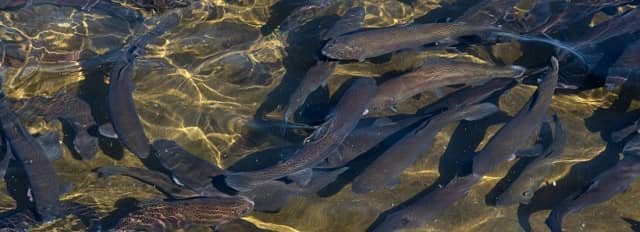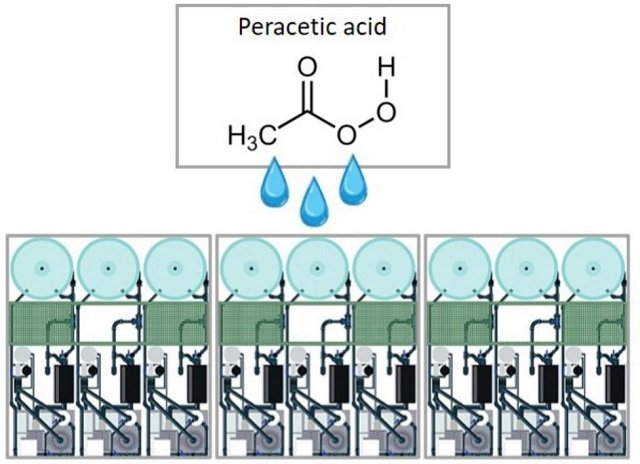
Aquaculture is a rapidly growing industry. To meet this increasing demand, aquaculture producers are exploring ways to incorporate more sustainable plant-based proteins into fish feed. However, some fish species struggle to efficiently digest these plant-based alternatives.
In this regard, food additives have been used to overcome this problem. However, another possible solution is tributyrin (TBT), a fat molecule that breaks down into butyric acid, a substance known to benefit intestinal health.
Researchers from the University of Aveiro, the University of Coimbra, and the University of Porto studied the effects of a plant-based diet supplemented with TBT on the structural diversity and putative function of bacterial communities in rainbow trout (Oncorhynchus mykiss) associated with digestion.
The challenge of plant-based diets for fish
While plant-based proteins offer a more environmentally friendly solution, they can cause digestive issues and hinder the growth of carnivorous fish. While using plant proteins in fish feed is a sustainable solution, it can present challenges. Carnivorous fish fed high levels of plant protein may experience:
- Slower growth
- Altered metabolism
- Increased diseases
- Nutrient deficiencies
- Changes in gut bacteria.
Butyrate to the rescue?
Studies show that supplementing fish diets with butyrate, a short-chain fatty acid, can help. Butyrate improves intestinal health, allowing fish to tolerate higher levels of plant protein in their diet.
Unfortunately, using butyrate directly in fish feed is impractical. It has a strong odor and taste that fish dislike, and it quickly breaks down in water. However, tributyrin offers a promising alternative.
Tributyrin: a stable alternative to butyrate
Tributyrin, a stable triglyceride, offers a solution. It is not unpleasant to fish and breaks down slowly in the intestines, releasing butyrate gradually.
Tributyrin is a fat molecule that breaks down into butyric acid, a substance that benefits intestinal health in both humans and animals. Studies have suggested that TBT supplementation can improve fish health and allow them to tolerate higher levels of plant-based proteins in their diet.
The power of gut bacteria
Fish have a complex ecosystem of bacteria living in their intestines. These gut bacteria play a crucial role in digestion, immune function, and overall health. The study investigated how tributyrin, a precursor to a molecule called butyrate, could influence these gut bacteria in rainbow trout fed a plant-based diet.
Stay Always Informed
Join our communities to instantly receive the most important news, reports, and analysis from the aquaculture industry.
While the study did not find significant overall changes in intestinal bacterial communities or digestive enzyme activity with TBT supplementation, deeper analysis revealed some interesting results:
- Targeted pathogen control: Higher levels of TBT (0.2% and 0.4% of the diet) appeared to suppress specific gut bacteria belonging to the order Enterobacterales, known to include some fish pathogens like Klebsiella pneumoniae.
- Potential for reduced disease: Functional analysis of bacterial communities suggested that increasing TBT levels could decrease pathways related to disease development in the intestine.
The future of sustainable aquaculture
These findings suggest that TBT may help suppress harmful bacteria in farmed fish, potentially reducing disease outbreaks in aquaculture settings. Further research is needed to confirm these results and determine the optimal levels of TBT for different fish species.
Conclusion
These findings suggest that TBT could play a role in promoting intestinal health in fish raised on plant-based diets. Specifically, it could help control potentially harmful bacteria and reduce the overall risk of disease.
Further research is needed to fully understand the specific mechanisms of TBT’s effect on fish gut bacteria and its potential benefits for aquaculture. However, this study opens an interesting avenue for exploring how dietary modifications can improve fish health and promote sustainable practices in the aquaculture industry.
The study was funded by the Fundação para a Ciência e Tecnologia (FCT; Portugal), and the European Regional Development Fund (ERDF/FEDER) through the Operational Programme for Competitiveness and Internationalization (POCI/POFC).
Contact
N. C. M. Gomes
Centre for Environmental and Marine Studies (CESAM) & Department of Biology
University of Aveiro
3810-193, Aveiro, Portugal
Email: gomesncm@ua.pt
Reference (open access)
Louvado, A., Coelho, F.J.R.C., Palma, M. et al. Study of the influence of tributyrin-supplemented diets on the gut bacterial communities of rainbow trout (Oncorhynchus mykiss). Sci Rep 14, 5645 (2024). https://doi.org/10.1038/s41598-024-55660-y
Editor at the digital magazine AquaHoy. He holds a degree in Aquaculture Biology from the National University of Santa (UNS) and a Master’s degree in Science and Innovation Management from the Polytechnic University of Valencia, with postgraduate diplomas in Business Innovation and Innovation Management. He possesses extensive experience in the aquaculture and fisheries sector, having led the Fisheries Innovation Unit of the National Program for Innovation in Fisheries and Aquaculture (PNIPA). He has served as a senior consultant in technology watch, an innovation project formulator and advisor, and a lecturer at UNS. He is a member of the Peruvian College of Biologists and was recognized by the World Aquaculture Society (WAS) in 2016 for his contribution to aquaculture.







